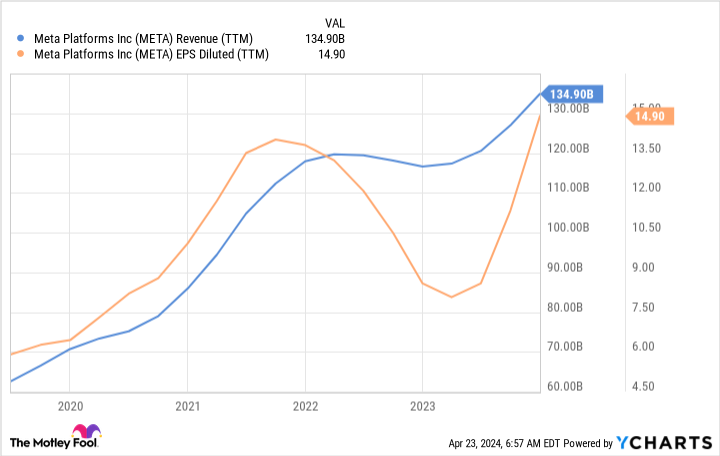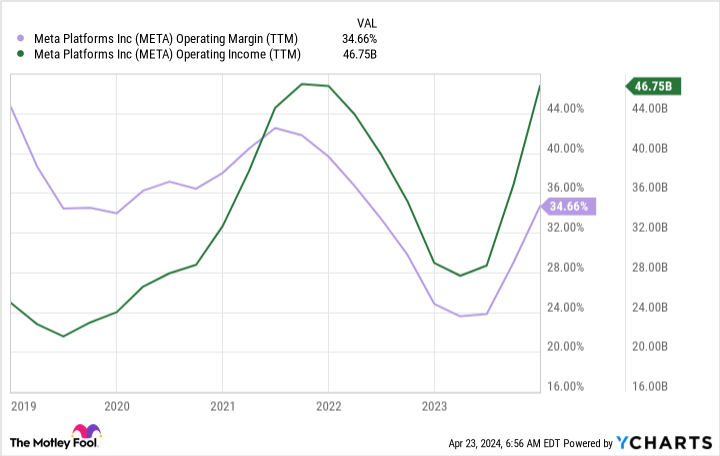Last year is often billed as Meta Platforms (NASDAQ: META) co-founder and CEO Mark Zuckerberg’s “year of efficiency.” Indeed, it should be billed as such. Meta earnings soared as the company cut expenses and started putting its AI to use to boost productivity (especially for social media ads), and thus earnings.
Despite this boost to Meta’s earnings power, there’s still work to be done. The virtual reality (VR) segment Reality Labs remains a sizable drain on efficiency. Reality Labs gobbled up a massive $16.1 billion in operating expenses in 2023 alone, on revenue of just $1.9 billion. In Q1 2024, Reality Labs reported another $3.85 billion operating loss.
But Zuckerberg and company may have a solution, one that could make the sky (or maybe more specifically, the Horizon) the limit for Meta profitability.
Meta goes open source
Last year, I highlighted how Meta’s big bet on VR and the metaverse could get a boost from all of the artificial intelligence (AI) work the company is doing. Meta itself confirmed as much in December, sharing how its AI models are helping accelerate development of new features that help bridge the gap between the virtual and real world.
But one big pain point is metaverse hardware. These days, Meta now has sizable competition with Apple now that the Vision Pro is here. If VR (or “spatial computing,” as Apple insists on calling it) is to be a thing, Meta needs to drive more user adoption of VR devices. Clearly, even tens of billions of dollars of research and development spent on its Realty Labs segment won’t simply do the trick.
To that end, Meta announced it’s opening up its VR platform to third-party developers — for both hardware and apps. Meta said this open ecosystem will be built on Horizon OS. Tech companies can now utilize Meta’s extensive VR headset technology, human-machine interaction capabilities like hand and body movement tracking and real-world sensing to build their own hardware and apps on Horizon OS.
Think of Horizon OS as Meta’s VR metaverse operating system like the equivalent to Microsoft‘s Windows OS for PC or Alphabet‘s Android OS for mobile. Up until this point, Meta has developed most of its VR headsets, the Quest 3 being the latest, in-house. App development has also been done mostly by in-house studios, with third-party app developers working on an invite basis.
It would seem that Meta is looking to monetize all of its tech development via licensing deals to computing device companies, as well as, more broadly, opening up app development and monetization. Per Meta’s news release:
“Developers and creators can take advantage of all these technologies to create mixed reality experiences. And they can reach their audiences and grow their businesses through the content discovery and monetization platforms built into Meta Horizon OS, including the Meta Quest Store, which we’ll rename the Meta Horizon Store.”
Put simply, a flood of new VR innovations could be coming our way in the near future.
The best path to further riches?
Meta is now sitting on years of elevated expenses in its Reality Labs segment. Meta has actually been quite transparent with those operating losses in the last five years. The segment has bled some $55 billion since 2019.
|
Year |
Meta Reality Labs Revenue |
Meta Reality Labs Operating Income (Loss) |
|---|---|---|
|
2019 |
$501 million |
($4.5 billion) |
|
2020 |
$1.14 billion |
($6.62 billion) |
|
2021 |
$2.27 billion |
($10.2 billion) |
|
2022 |
$2.16 billion |
($13.7 billion) |
|
2023 |
$1.9 billion |
($16.1 billion) |
|
Q1 2024 |
$440 million |
($3.85 billion) |
Data source: Meta.
Those operating losses are incredible, even for Meta’s mighty social media profit machine. Operating margin in the first quarter dialed in at 38% on total revenue of $36.5 billion — the vast majority of that from social media ads, of course. Now imagine a Meta where VR isn’t a major drag.
It’s clear that one of the top ways Zuckerberg’s “year of efficiency” can be extended into 2024 and beyond is to help transform Reality Labs into a component that’s pulling its own weight. Turning all of the virtual reality and metaverse tech into a revenue-generating ecosystem of third-party developers could be a semi-fast-track to doing just that, although management said to expect Reality Labs operating losses to deepen “meaningfully” later this year.
For now, with efficiency gains from last year still boosting expected earnings growth in 2024, Meta stock still looks reasonably priced. Shares trade for about 20 times Wall Street analysts’ expectation for 2024 earnings. I remain a happy shareholder.
Should you invest $1,000 in Meta Platforms right now?
Before you buy stock in Meta Platforms, consider this:
The Motley Fool Stock Advisor analyst team just identified what they believe are the 10 best stocks for investors to buy now… and Meta Platforms wasn’t one of them. The 10 stocks that made the cut could produce monster returns in the coming years.
Consider when Nvidia made this list on April 15, 2005… if you invested $1,000 at the time of our recommendation, you’d have $488,186!*
Stock Advisor provides investors with an easy-to-follow blueprint for success, including guidance on building a portfolio, regular updates from analysts, and two new stock picks each month. The Stock Advisor service has more than quadrupled the return of S&P 500 since 2002*.
*Stock Advisor returns as of April 22, 2024
Randi Zuckerberg, a former director of market development and spokeswoman for Facebook and sister to Meta Platforms CEO Mark Zuckerberg, is a member of The Motley Fool’s board of directors. Suzanne Frey, an executive at Alphabet, is a member of The Motley Fool’s board of directors. Nicholas Rossolillo and his clients have positions in Alphabet, Apple, and Meta Platforms. The Motley Fool has positions in and recommends Alphabet, Apple, Meta Platforms, and Microsoft. The Motley Fool recommends the following options: long January 2026 $395 calls on Microsoft and short January 2026 $405 calls on Microsoft. The Motley Fool has a disclosure policy.
Meta Plans to Outsource VR Hardware Development to Boost Profits — Is It Time to Buy the Stock? was originally published by The Motley Fool

Maria Malik is your guide to the immersive world of Virtual Reality (VR). With a passion for VR technology, she explores the latest VR headsets, applications, and experiences, providing readers with in-depth reviews, industry insights, and a glimpse into the future of virtual experiences.




